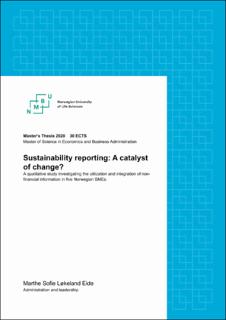| dc.contributor.advisor | Aarset, Bernt | |
| dc.contributor.author | Eide, Marthe Sofie Løkeland | |
| dc.date.accessioned | 2021-03-23T13:31:55Z | |
| dc.date.available | 2021-03-23T13:31:55Z | |
| dc.date.issued | 2020 | |
| dc.identifier.uri | https://hdl.handle.net/11250/2735137 | |
| dc.description.abstract | Background: Existing literature point to sustainability reporting as a tool to improve sustainable profitability and claim that promoting the availability and utilization of non-financial information to decision makers, represents an unexploited potential for facilitating a sustainability transition for the business world. However, literature also claims that today´s sustainability report practice mainly leads to non-financial data of such low quality that it hinders the business in directly using the data for improving the company´s sustainability performance.
Purpose: Consequently, the purpose of thesis is devoted to increase the understanding of how non-financial information retrieved for reporting on sustainability, is being integrated and operationalized in Norwegian small and medium-sized enterprises (SMEs) today, and how the motivations and ethical values shape how the non-financial information is utilized on company-level.
Methodology: The research was carried out as a qualitative multi-case study, studying five Norwegian SMEs that have an established sustainability reporting practice. The primary source of data was semi-structured interviews with 6 relevant interviewees from the chosen cases. Supplementary data was retrieved from the case´s sustainability reports and 6 open interviews with leading interest organisations and other relevant institutes.
Main findings: All the SMEs investigated state that in order to be effective in improving the overall sustainability performance of the company, the retrieving of non-financial information needs to be less resource demanding, less cumbersome and less complex. The study further reveals that how the companies were utilizing and integrating their non-financial information, was largely based on one pivotal aspect: Motivation. In this thesis I have classified the motivations found in literature in two main groups; 1) exogenous and 2) endogenous motivations. Having sustainability built into the business model or the urge of one daily manager wanting to transform the company, are examples of endogenous motivations found in the empirical study. Examples of exogenous motivations are costumer demand and branding. In fact, the findings illustrate the divide between “exogenously” and “endogenously” motivated companies and parted the five cases in two distinct groups. The endogenously motivated cases showed a strong connection between sustainability reporting and sustainable profitability, while the exogenously motivated cases failed to show a direct link between sustainability reporting and increased sustainability performance. | en_US |
| dc.language.iso | eng | en_US |
| dc.publisher | Norwegian University of Life Sciences, Ås | en_US |
| dc.rights | Attribution-NonCommercial-NoDerivatives 4.0 Internasjonal | * |
| dc.rights.uri | http://creativecommons.org/licenses/by-nc-nd/4.0/deed.no | * |
| dc.title | Sustainability reporting : a catalyst of change? : a qualitative study investigating the utilization and integration of nonfinancial information in five Norwegian SMEs | en_US |
| dc.type | Master thesis | en_US |
| dc.description.localcode | M-ØA | en_US |

